Glutaric Acidemia: Hope & Help for Parents
Glutaric Acidemia, Type 1 (GA1) is a relatively new and rare diagnosis, and while there are still many unknowns, the good news is that there is hope. You are not alone.
My son was first diagnosed with GA1 when he was 11 months old, and after receiving the phone call, I immediately started searching the internet for information. There wasn’t much available, and what was available was depressing, hard to understand, and dreary. It didn’t seem like there was going to be a good prognosis no matter what we did. I kept thinking surely I wasn’t the only parent out there with a child with this condition, but information was tough to find.
This page is to provide you with hope, help, and information about how we live our daily lives with GA1, and also to connect you to other parents who have kids with GA1.
Disclaimer: I want to stress that I’m sharing from my experiences. First and foremost, seek help from your doctor and other experts. I am not giving medical advice.
That being said, you are your child’s best advocate, and it is true that this is a little-known disease. While we have been fortunate to have access to good medical care, it’s possible that your doctor might have treated very few or no other children with your child’s condition.
Second, I am sharing from my experiences as the parent of a child who has NOT had a metabolic crisis. If you are brand new to GA1, you will learn that there are children with this condition who have seemly few to no outward effects from the condition and do not suffer a metabolic crisis. There are those children who do not have a metabolic crisis and yet seem to have some neurological impairments. Doctors do not fully understand why this is true. Finally, there are those children who have had a metabolic crisis, which causes devastating, life-long effects, although there is a wide range of how children recover. As a community of parents, we do our best to embrace one another, and I do not mean to exclude any parents who have had a vastly different experience from my own. I can only properly share my own experience. I invite other parents of kids with GA1 to comment in the comment section below and share about their experiences.
Answers from a Parent of a Child with GA1
Q: I don’t understand this diagnosis and this disorder.
A: Welcome to the club you never wanted to join.
Although much more is understood about Glutaric Acidemia Type 1 than in the past, there are still so many unknowns. Information and treatment has changed quite a bit in the last 7 years we have been treating our son, so I’m sure it will continue to change going into the future.
The good news: We expect Zack to have a normal life expectancy and to lead a mostly typical life, and many families today can have that hope for their children with GA1.
Q: What is your family’s story?
A: Our son, Zack, has GA1. He was diagnosed when he was 11 months old, which is somewhat unusual because his Glutaric Acidemia was not picked up on newborn screen, although I’ve learned that there are many paths to diagnosis with this condition. Getting a diagnosis is not always clear-cut, although many children’s conditions are now discovered on newborn screen, which is a wonderful thing, because treatment can begin right away, and this is life-saving!
Zack had an elevated blood level when he was a little older, and then required a skin biopsy in order to have a definitive diagnosis, and many children need this test for a final conclusive decision. Zack also had an MRI to check for bleeding in the brain when he was young.


In the past, the main way for the condition to be discovered was when children had already had a metabolic crisis, or possibly when a sibling had a crisis. Now more and more children are found to have the condition, receive treatment, and live a more typical life WITHOUT A METABOLIC CRISIS. While living with the condition is not easy, living a life without a metabolic crisis is such a huge thing.
As of this writing, our son is 7 years old, and he has not had a metabolic crisis.
Our son Zack is adopted, so my husband and I are not carriers of this gene. I want to stress that you did not somehow “give” this to your child and this is NOT YOUR FAULT. There is a great deal of guilt that comes along with genetic conditions. As an adoptive parent I have a bit of perspective here, and I want to tell you — again, clearly — this is not your fault. You would never have knowingly given this to your child. You didn’t know. Even if this is your second (or more) child and you decided to take what some people would consider a risk to have additional child, you still would never wish this condition on him or her.
We knew about Zack’s condition when we adopted him.
Q: Is there hope after a diagnosis of Glutaric Acidemia Type 1?
A: Yes! Most parents describe the day of “the phone call” as the day they felt like their world was crashing down, the day they felt like their life fell apart, and other similar descriptions. Finding out that your child has a life-threatening condition is devastating. (And yes, GA1 is life-threatening, and our kids do qualify for Make-a-Wish trips, by the way. Our family went on one.) Allow yourself time and space to grieve, because this is a grief process. Your life is going to change, and there is no avoiding that.
I really, REALLY want to encourage you, though, that there is also MUCH HOPE.

Zack at the Courage Classic. One of the volunteers saw how excited Zack was and gave him a medal of his own. He was beside himself. He kept saying, “I won! I won!” The Courage Classic has a super-cool finish because kids who have been patients at the hospital hand out medals at the finish line.
Q: What about illness and GA1?
A: The absolute worst thing about Glutaric Acidemia (in my opinion) is risk of metabolic crisis with illness. It leaves us as parents constantly on pins and needles, questioning decisions, and generally with a cloud of fear over our heads. I wrote a blog post about life with the risk of illness with GA1 here.
The good news is that risk of metabolic crisis goes down with age. Years 1-3 carry the greatest risk. ANY illness during this time needs to be taken VERY VERY seriously. Call your metabolic doctor at any sign of illness. You are not overreacting or being a helicopter parent for calling.
If the doctor agrees that you need to take your child to the ER, GO. Do not wait. In advance, your doctor should give you an emergency protocol letter. ER staff need to be alerted to follow this protocol immediately — no waiting. Be your most mama-bear, advocate self on this. It does not matter if your child does not look very sick. The biggest concerns are vomiting, diarrhea, not eating, and fever, but any illness is a reason to call.
I’ve parented my own 5 children plus 35 foster children, including medically fragile babies and older children with significant behavior needs. It takes a whole heck of a lot to get me worried. I don’t overreact to much anymore. But Glutaric Acidemia in young babies and toddlers makes me nervous, and it should. This is serious. I don’t say that to freak you out, but proper illness treatment can mean the different between life-long physical and neurological impairments, and a relatively typical life.
This really stinks, but if your child under the age of 3, and probably before the age of 6, has any illness (more than a light cold, or anything lasting more than a few hours), chances are he or she will probably be hospitalized and given fluids, sugars, and possibly fats (lipids) to prevent metabolic crisis. If you are thinking this is horrible news, I will tell you it’s not great. It’s scary, expensive, overwhelming, and life-changing. This is very difficult. But, it’s all worth it for our little guys and girls, because it’s what we have right now to treat this, and thank God we at least have something.
Zack was hospitalized about 7 times in the first 4 years of his life. Most of those times were because he was one of those kids who tends to get croup. Some kids are like that. He actually wasn’t all that sick, but a dose of Decadron is the treatment, which is a steroid. The issue there is that steroids affect metabolism, which is a problem for our kids. So he would be hospitalized, partly because of the illness, but partly because of the medication. He also had a respiratory virus once.
From ages 3-6, there is still risk of metabolic crisis with Glutaric Acidemia, but the risk goes down significantly. Still call the doctor with signs of illness. Your child will still likely be hospitalized. But you can relax a little bit with things.
After age 7, there is the potential for a crisis, but it’s very highly unlikely. We do still alert Zack’s doctors if he gets very sick (stomach flu or a fever). We do not feel concerned if he has a minor illness like a cold, unless it makes it so he doesn’t eat or drink anything.
Q: What do you do about illness prevention?
A: We have a wonderful Facebook Group for Parents of Kids with GA1. If you are parent of a child with Glutaric Acidemia Type 1, definitely come and request to join. You will find tons of great support there! Also check out the Bailey Baio Angel Foundation and Organic Acidemia Association which are both a wonderful support for our families.
Before joining the group, it didn’t occur to me to do much more than the usual to prevent illness with Zack. Our clinic stressed that WHEN he gets sick we should call right away, but otherwise allow him to lead a normal life.
However we learned that there are many parents who have chosen to go a different route and do everything in their power to prevent illness, due to the fact that a metabolic crisis with GA1 is so serious. You can read more about this topic here: Zack is Sick Today: How to Live with Fear. There is really no right answer with this, and doctors will give totally different advice, because this is a parenting issue, not a medical issue. Each family has to do what is right for them and what makes it so they can sleep at night.
We chose to have a more liberal approach than some families, who are very restrictive. Zack attended preschool and school. We go to church and to the store. During the times of highest risk (when Zack was young and during the winter months) we did try to steer clear of anyone who was the least bit sick, and I cleaned a lot, but we didn’t stop regular life.
Q: How do you manage the low protein diet?
A: Check out this post I wrote: How to Manage Your Child’s Special Diet (and Still Have a Life), which goes into a lot of specific detail of how we manage Zack’s low protein diet for day to day living.
I have to be honest about this. Maybe it’s my own food obsessions, but when Zack was first diagnosed with GA1, what overwhelmed me with most was the low protein diet. It seemed sooo restrictive and changed life so much! Yes, the fear with illness was horrible, but day to day it’s the low protein diet that makes everything so tough.
I’m here to tell you, 6 years into it, that it’s really not that bad. When Zack was diagnosed, much was not known about Glutaric Acidemia and he was placed on a VERY low protein diet like is used for PKU. He started with a food budget of 4 grams of protein per day, plus what was in the milk in his formula. Treatment understanding has changed, plus as Zack has grown he is allowed more protein because protein allotment for GA1 is determined by body weight.
Today Zack eats 25 grams of protein per day from regular foods, and while there are still many foods he doesn’t eat, this is really quite do-able. We are able to estimate his food allowance most days, and we are able to use food labels (not a special book). Zack eats regular foods and few specific low-protein foods. He eats things like whole wheat bread and pasta, brown rice, lower protein vegetarian meals and burgers, tortillas, crackers, and all kinds of fruits and veggies.
Once in awhile Zack gets upset because he wants the food we are eating, but most of the time he takes it in stride. We have been able to manage eating out, birthday parties, school, and other life events.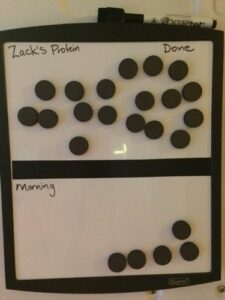

Zack’s red gear — Rubbermaid
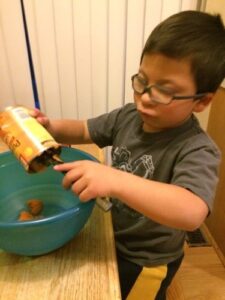
Q: What About School?
A: Kids with Glutaric Acidemia can have accommodations made so that they can do just fine in school. The goal is to partner together with your school team to provide a great environment in order for your child to be successful and safe. We have had great experiences for our son Zack. While moving in a large school system is never easy, most individual educators honestly want to help kids, keep them safe, and let them thrive in the best environment.
An IEP is an Individual Education Plan. (Check out: What is an IEP?) This is not necessary strictly for GA1. If your child has other factors, such as signficant learning disabilities or developmental delays, your child might need an IEP. If so, all of the needs for Glutaric Acidemia can be included as part of the IEP. An IEP is a powerful, legally binding document.
A 504 is a plan developed for a child who has a disability, to be sure this child receives necessary accommodations. (See: What is a 504?) This is a totally different type of document, can be harder to obtain, and schools are not nearly as familiar with them. However, these are often more appropriate for children with GA1.
Receiving a 504 can be done — we had one for one of our other children, so I understand the process. Providing the necessary medical documentation of a disability and the fact that this disability impacts education is what is necessary in order for your child to receive a 504. You as the parent will probably need to advocate for this to happen. A 504 may or may not be necessary, depending on what accommodations the school is willing to provide without one.
A school medical plan is a plan you will put together with the school nurse, and this is an important document for our kids with Glutaric Acidemia. My recommendation would be that every child with Glutaric Acidemia Type 1 have a school medical plan. Work together with the nurse to really make this a helpful document, because if your child gets sick during the day or needs something, and if for some reason you are not available right away, the school will pull out this document for help. Here is a copy of a school medical plan for diabetes treatment, to give you a rough idea of what one might look like.
Our son’s school medical plan includes items such as: when he should drink his formula and where it should be stored, when he should use his cooling vest and where the ice packs are stored, what to do in case they need to call 911 (a copy of his Emergency protocol letter would go with him to the ER in case we needed to meet him there), what language we use around his special foods, what foods he never should eat, how to contact us as parents should food issues come up at school like for classroom parties we didn’t know about in advance, what signs of illness to call about, and we include phone numbers of all our emergency contacts and Zack’s doctors.
Q: How do you cope?
A: For all of us with a child with special needs, it can become incredibly easy, incredibly quickly, for life to become all about the disorder. Sometimes this is unavoidable, but do everything in your power to resist this. Your life is NOT all about GA1, and your child is so much more. Your child is not a “GA1 kid” but instead a child who has GA1, and there is a big difference. This will always be part of your life, but there is no reason why it needs to overtake your whole life, unless you choose to let it.
There are some incredibly difficult moments and there will be others ahead. I have shed buckets of tears over this diagnosis and others for my kids with special needs. Yet the minutes on the clock continue, and we continue too. My faith sustains me and God brings me new mercies every morning.
The steadfast love of the Lord never ceases;
his mercies never come to an end;
they are new every morning;
great is your faithfulness.Lamentations 3:22-23
You are always welcome to email me, [email protected], and be sure to check out the Facebook group for parents.
Q: What is the life expectancy of a person with GA1/Glutaric Acidemia Type 1?
People with GA1 who have not had a metabolic crisis can expect to life a full, normal life. Much is still unknown about GA1, but as more people are discovered who have the disorder, we are seeing more people who are living full, normal lives. Strict treatment during illness during the early years is of utmost importance in order to prevent a metabolic crisis, although in some cases is it unpreventable despite our best efforts. Other symptoms (such as headaches) seem to arise in some individuals but so far this is anecdotal and hasn’t been proven over a large population of people with GA1. More research is needed.
Additional Questions 5/16/16
I’ve been asked some additional questions from parents that I will address here.
Can a child with GA1 qualify for SSI (Social Security Income) benefits? It is possible, as GA1 is considered life-threatening. You must have little to no income, and the child’s disability must severely limit his or her ability to function now and for a long time to come. Your state agency will determine if your child qualifies. See this link for further details.
Our clinic wants to take my child off of formula after age 6. Why is this? Many clinics now believe children with GA1 (who are not severely affected) can live without formula after age 6. Check with your doctor for what is right for your child.
Does your child overheat?
Yes, Zack sweats and lot and overheats, which we think is from GA1. He uses a cooling vest like this one.

Cooling vest, phase changing packs, which we recommend over water soaking.
Please leave a comment below and connect with me and other parents, too. Do you have a child diagnosed with GA1?
More Posts You Will Love
Zack is Sick Today: How to Live with Fear
How to Manage Your Child’s Special Diet (and Still Have a Life)
For the Mom at the Slide: When Parenting is Frighteningly Hard


Mike and Zack at packet pick up for Courage Classic

Living with a child’s disability is very stressful. Please check out this resource I wrote, too: The Hope Toolbox Printable Workbook
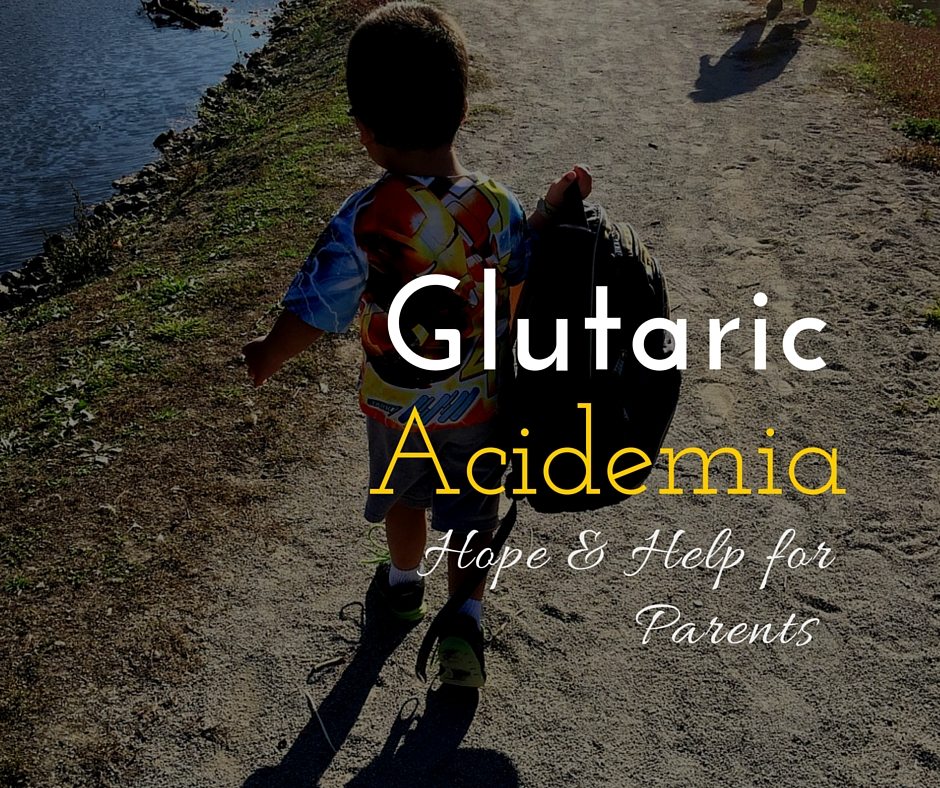

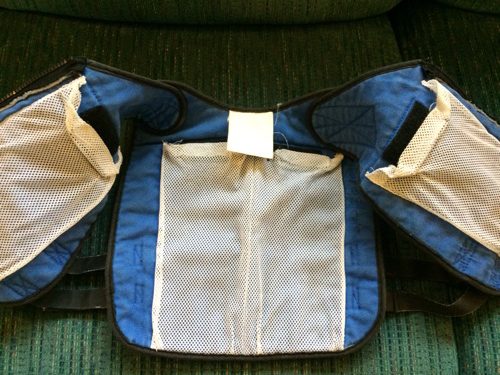
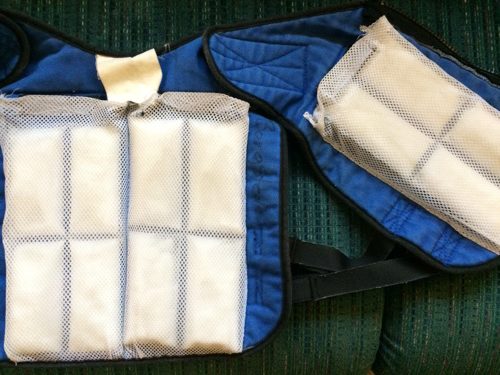







hi sara
I have a child diagnosed as GA 1
but I am from Egypt as you know we are from a developing country so neither the doctors not nutritionist know a thing about this disease
would you recommend me a dr I can email him to follow up this poor girl case
I had read your posts and I think that she developed a crisis coz now she is a 3 year old and cant walk , speak or eat
I appreciate your help